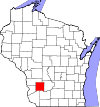Richland County Criminal Court hears all criminal cases in Richland County. Below you will find specific information about criminal cases and how they are handled in Richland County.
What happens in Richland County at an arraignment?
In Richland County the defendant is brought into court and informed by the judge of the charges that have been filed against them along with informing them of their rights. At this time, the defendant can plead guilty, not guilty or no contest. If the defendant pleads guilty or no contest, there will be no trial and the defendant may be sentenced immediately or at a later date. If the defendant pleads not guilty a trial date is set.
Who is the prosecutor for Richland County?
Depending upon the case, the prosecutor for Richland County criminal cases will either be a representative of Richland County or a representative from Wisconsin. After reviewing evidence it is the prosecutor’s decision whether to file charges or drop a case. Most prosecutors have the ability to negotiate plea bargains, and determine how the case will be prosecuted.

Richland County Criminal Court
Burden of Proof Requirement
In a criminal case in the United States, the burden of proof always requires the prosecutor to prove beyond a reasonable doubt that the defendant is guilty. This is a high threshold that must be met by the prosecution when presenting evidence in a case. If the prosecution fails in it’s burden to prove guilt beyond a reasonable doubt the judge must find the defendant not guilty. In a jury trial, the judge will inform the jury what this burden is and their obligation to find the defendant not guilty if they feel the prosecution did prove the defendant’s guilt beyond a reasonable doubt.
If guilty, who sentences the defendant?
If the defendant is found guilty after the trial, the defendent will be sentenced. In some cases, this can occur at the same hearing the defendant is found guilty in court, in other cases a separate hearing will be required. Often the prosecution will request a particular sentence for the defendant and the judge will determine whether to enforce this sentence or impose a different sentence for the defendant.
I need help for my Richland County criminal case
The best place to get information about your criminal case is from an attorney. If you cannot afford an attorney, the court will appoint one to represent you which will assist in your case. For general information about your case the Richland County court clerk is able to provide general information about your specific case (e.g. date/time hearings, mandatory appearance, what will take place and what you will be required to do). The court clerk for Richland County will NOT be able to provide legal advice for your case, only an attorney can provide legal advice. The court clerk can provide legal information (like the information found on this website) about your case but cannot provide advice about what you should do in your legal manner.
What is Jury Deliberation?
After both the prosecution and defense have presented their cases, the judge in the case will provide instructions to the jury about what they must decide. The jury will be dismissed to the jury room where they will deliberate about the guilt or innocence of the defendant. After reaching a unaminous decision, they return their decision to the court where it is read aloud in the courtroom. If the jury is unable to reach a unaminous decision, the jury is deadlocked, also known as a hung jury, in which a mistrial will be declared.
What is a Plea Agreement?
A plea agreement is a deal made between the prosecution and the defendant in a case, where the defendant agrees to plea guilty to a particular charge in exchange for some concession from the prosecutor. In practice, more than 90% of criminal cases end with a plea agreement.
Richland County Required Court Appearances
In Richland County, there are both required and non-required court appearances for the defendant. At a required or mandatory appearance hearing, the defendant is required to appear in person before the court. Failing to appear at your required hearing may result in a bench warrant being issued for your arrest by the judge.
Right to Jury Trial
For “Serious Crimes”, those that can have a potential penalty of 6 months in jail OR a minimum $500 penalty, the US Constitution guarantees a right to trial by jury. This is guaranteed by Article III of the Constitution and the 6th Amendment. The accused has the ability to waive their right to trial by jury.
Appealing a Criminal Conviciton
A defendant may appeal a criminal conviction to an appellate court. In an appeal, the actual trial is not redone, but the appellate court hears arguments that the criminal case was not handled in a legal manner at the original criminal court. The appellate court can either uphold the conviction, or determine that errors were made and may request a retrial, a resentencing of the defendant or that the charges be dismissed.
Richland County Criminal Court hearings
Criminal hearings in Richland County will take place at the Richland County Criminal Courts. Please see here for a list of the Richland County Criminal Court Locations.
The Right to Counsel
The Fifth and Sixth Amendments to the U.s. Constitution give defendants in criminal cases the right to counsel/attorney. If you cannot afford an attorney one will be appointed to represent you. Like other rights a defendant has, this one can be waived as well and alternatively you can choose to represent yourself.
Richland County Criminal Court Locations
-
Richland County Circuit Court
Address: 181 West Seminary Street, PO Box 655, Richland Center WI 53581
Phone: 608- 647-2626 -
Kickapoo River Municipal Court
Address: 106 West Wisconsin Street, PO Box 38, Viola WI 54664
Phone: 608-627-1831 Fax: 608-627-1700 -
Village of Lone Rock Municipal Court
Address: 350 East Commercial Street, PO Box 163, Lone Rock WI 53556
Phone: 608-583-5825